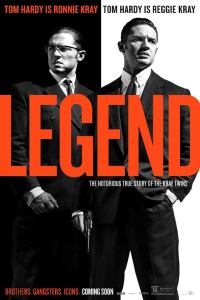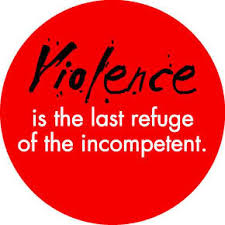LEGEND
1. a traditional story sometimes popularly regarded as historical but unauthenticated.
synonyms: myth, saga, epic, tale, story, folktale, folk story, fairy tale, fable, mythos, folklore, lore, mythology, fantasy, oral history, folk tradition; urban myth
2. an extremely famous or notorious person, especially in a particular field.
synonyms: celebrity, star, superstar, icon, phenomenon, luminary, leading light, giant; Mor
My older sister came to stay from interstate this week and I took the opportunity to use complimentary tickets for Studiocanal’s latest promotion Legend “the notorious true story of the Kray twins“. The film focuses on the notoriety of identical twin gangsters Reggie and Ronnie Kray, and their criminal empire in the East End of London during the 1960s.
To be honest, I doubt if I would have gone to see this film without the free tickets because I grew up in an era with the Krays forever in the news – and it was all bad as these headlines from UK newspapers show:
I didn’t want to see a film glorifying violence or justifying the appalling behaviour of these would be celebrities. Thankfully, Legend does not do either of these things. There are violent scenes and offensive language, but the movie concentrates on the love affair between Reggie Kray and Frances Shea and a very short time in the life of the Krays London-based criminal empire and gangster status. Frances is the narrator and we know what she wants from the relationship early in the film:
Frances Shea: You could go straight…
Reggie Kray: Life isn’t always what we want it to be.
While there is an attempt to show the human and vulnerable side to Reggie, the ultimate reality and tragic consequences dispels any sympathy you may feel for the main character. Legend is definitely not Joseph Campbell’s hero’s journey!
The storyline is almost palatable when centered around the brief courtship and marriage of Reggie and Frances with the criminal activities as subplots. However, trying to make Ronnie and Reggie behave in a loving way towards anyone, even each other, an impossible task if you also depict the documented behaviour of the Krays and the other psychopaths and morons who were their associates. The episodic violence and scattering of references to celebrities, politicians and other gangsters of the time leaves unresolved and confusing subplots, but also destroys any sympathy for the people in their social circle.
However, the acting of Emily Browning as a ‘fragile’ Frances Shea and Tom Hardy as both Kray brothers lifts the film from mediocre to memorable. There are also some solid performances from recognisable British character actors showing good casting from writer/director Brian Helgeland. Christopher Eccleston plays a suitably frustrated Detective Nipper Read who eventually gets his ‘man’ and Tara Fitzgerald is a fearless and angry Mrs. Shea devastated at her daughter’s infatuation with Reggie.
Legend reveals both brothers as paranoid and violent. Their delusions of invincibility divorced from reality, although only Ronnie diagnosed as paranoid schizophrenic. This quote early in the movie sums him up:
Dr. Humphries: Your brother Ron is violent and psychopathic, and I suspect he’s paranoid schizophrenic… to put it simply he’s off his fucking rocker!
[thrusts a bottle of pills to Reggie]
Dr. Humphries: Make sure he takes these…, or they’ll be serious trouble.
The doctor’s comment an understatement! Check out Monty Python’s ‘Pirhana Bros’ sketch lampooning the Krays. This pretty well sums up what people of my generation familiar with the real life ‘legend’, thought of creeps like the uneducated Krays who were not bright or smart, but epitomised the adage ‘brawn over brains’.
Perhaps the one lesson to take away from Legend is that there was a time in British justice when murderers were gaoled for life – Ronnie Kray (62) died in prison and Reggie (67), sentenced to 30 years, served 33 because of his prison behaviour and released on compassionate grounds, died 6 weeks later from cancer. The Krays had an older brother Charlie (73) not mentioned in the film. He also died in prison a few months before Reggie.
The film has had mixed reviews since its release and I can understand why. The acting is superb and I loved the soundtrack of mainly 60s music. The set design offers the authenticity we’ve come to expect from British period productions. Movie trivia reveals:
“The Blind Beggar pub featured in the movie is The Royal Oak on Columbia Road in London. The pub has featured in many British TV programmes. It was the same pub used in ’90s sitcom Goodnight Sweetheart and was also the scene of Victor Meldrew’s failed reunion with friends in the last episode of One Foot In The Grave.”
However, in depicting the truth about the Krays, even a condensed version of their vicious amoral life, there is not much to enjoy. You leave the cinema with a sense of relief it’s over.
We don’t learn enough about the police officers involved or see how the Krays are eventually charged and sentenced to understand what real impact they had on London. Reggie’s dramatic about turn in his treatment of Frances so sudden and out of character it strips away all pretence that the movie is a love story and makes you realise that storyline arc not developed well at all.
Yet, for all the criticisms, I think the viewing public, accepts the film on face value, acknowledging Tom Hardy’s amazing triumph acting identical twins in such a way that audiences are convinced it is two separate people. And, as mentioned before, Emily Browning is stunning as the vulnerable and fragile Frances even though we could have done with more of her backstory. The glimpses of humour mainly provided by ‘mad’ Ron are not overdone and are believable for that character.
“In the UK, Legend (2015) became the highest grossing 18-rated British film of all time, surpassing Trainspotting (1996)….”
Despite the fact:
“Critic Benjamin Lee of The Guardian wrote a negative review of the film, giving it only two stars: a poster for British distributor Studio Canal displayed these, but placed them between the twins’ heads, so that at first glance The Guardian appeared to be one of many outlets that had run four- and five-star reviews (until Lee himself pointed this out on Twitter).”
Fortunately, the violence is not as graphic as it could have been and the film does not glamorise gangsters or criminal activity – you leave the cinema glad the Krays are no longer around. There are many unexplored threads, especially in relation to Ronnie’s mental illness and treatment juxtaposed with the depression (?) Frances obviously suffered and the pills she popped.
There is also a hint that Reggie is psychopathic too:
Ronald Kray: [on his twin stabbing Jack] Why did you kill him?
Reggie Kray: [walks up, so he is pressing his forehead against his twin] Because I CAN’T KILL YOU!
Mind you by the end of the film I think most people in the audience empathised with those sentiments! Perhaps even extended hopes of retribution, vengeance and justice towards both Krays and everyone in their circle of friends who took part in the attempt to build a ‘gangster kingdom’ in 1950s/60s Britain!
Please let me know what you think of the film if you see it.





Well, well, I had no idea that the Piranha Bros was based on real life!
It doesn’t sound like the sort of film I’d want to see, glorifying or not, I’m just not interested in the sleazy side of life.
LikeLike
Unfortunately, Lisa it is thrust upon us too often – the evidence of politicians in both the House of Lords and Commons, high-ranking police officers and judges who they bought is quite depressing – and no doubt that sort of corruption continues today by others. (Especially in relation to paedophilia! The decriminalisation of prostitution and homosexuality took the wind out of some of their sails, but sleaze finds its way… )
LikeLike
Indeed it does, indeed it does…
LikeLike